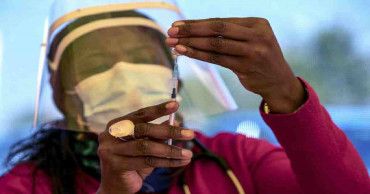Cape Town
Fire ravages Cape Town seat of South Africa's Parliament
Firefighters battled a major blaze at South Africa's Parliament complex on Sunday that sent a dark plume of smoke and flames into the air above the center of Cape Town and caused some ceilings of the building that houses the national legislature to collapse.
The fire started on the third floor of an old building that houses offices and spread to the National Assembly building, where South Africa's Parliament now sits, Minister of Public Works and Infrastructure Patricia de Lille said.
Read:After suicide bombing, Congo officials fear more attacks
“The fire is currently in the National Assembly chambers,” De Lille told reporters at the scene. “This is a very sad day for democracy for Parliament is the home of our democracy.”
City of Cape Town Fire and Rescue Service spokesman Jermaine Carelse said no injuries were reported. Parliament was closed for the holidays.
Security guards first reported the fire at around 6 a.m., Carelse said, and 35 firefighters were on the scene. Some of them were lifted into the Cape Town skyline on a crane to spray water on the blaze from above.
They were still fighting the fire more than six hours later.
South African President Cyril Ramaphosa was briefed on the fire, De Lille said, but it was too early to speculate on a cause. She said authorities were reviewing video camera footage.
The deputy minister of state security was also at the Parliament complex. Parliament speaker Nosiviwe Mapisa-Nqakula cautioned against speculation that it was a deliberate attack.
"Until such a time that a report has been furnished that there was arson, we have to be careful not to make suggestions that there was an attack,” she said.
President Ramaphosa and many of South Africa's high-ranking politicians were in Cape Town for the funeral service of Archbishop Desmond Tutu, which took place on Saturday at the city's St. George's Cathedral, about a block away from the Parliament precinct.
The precinct has three main sections, the original Parliament building completed in the late 1800s and two newer parts built in the 20th century.
The fire initially was concentrated at the old Parliament building, which is located behind the National Assembly, De Lille told reporters in front of the Parliament complex gates. During that briefing, she said firefighters “have the situation under control," but the fire spread soon after and tore through the current Parliament building.
Read:Suicide bomber attacks bar in eastern Congo, killing 6
Authorities feared that others parts of the buildings in the precinct might collapse because of the heat while historical artefacts inside were likely to be damaged or destroyed. The top part of the bright white National Assembly building had been burned black as smoke billowed out its roof.
“The bitumen on the roof is even melting, an indication of the intense heat. There have been reports of some walls showing cracks, which could indicate a collapse,” News24 website quoted Carelse as saying.
Police cordoned off the complex and closed roads. Some of the blocked-off areas were near where people had left flowers and other tributes to Tutu.
A huge wildfire on the slopes Cape Town's famed Table Mountain last year spread to buildings below and destroyed part of a historic library at the University of Cape Town.
4 years ago
‘This IS INSANE’: Africa desperately short of COVID vaccine
In the global race to vaccinate people against COVID-19, Africa is tragically at the back of the pack.
In fact, it has barely gotten out of the starting blocks.
In South Africa, which has the continent’s most robust economy and its biggest coronavirus caseload, just 0.8% of the population is fully vaccinated, according to a worldwide tracker kept by Johns Hopkins University. And hundreds of thousands of the country’s health workers, many of whom come face-to-face with the virus every day, are still waiting for their shots.
In Nigeria, Africa’s biggest country with more than 200 million people, only 0.1% are fully protected. Kenya, with 50 million people, is even lower. Uganda has recalled doses from rural areas because it doesn’t have nearly enough to fight outbreaks in big cities.
Read:UN: Famine is imminent in Ethiopia’s embattled Tigray region
Chad didn’t administer its first vaccine shots until this past weekend. And there are at least five other countries in Africa where not one dose has been put into an arm, according to the Africa Centers for Disease Control and Prevention.
The World Health Organization says the continent of 1.3 billion people is facing a severe shortage of vaccine at the same time a new wave of infections is rising across Africa. Vaccine shipments into Africa have ground to a “near halt,” WHO said last week.
“It is extremely concerning and at times frustrating,” said Africa CDC Director Dr. John Nkengasong, a Cameroonian virologist who is trying to ensure some of the world’s poorest nations get a fair share of vaccines in a marketplace where they can’t possibly compete.
The United States and Britain, in contrast, have fully vaccinated more than 40% of their populations, with higher rates for adults and high-risk people. Countries in Europe are near or past 20% coverage, and their citizens are starting to think about where their vaccine certificates might take them on their summer vacations. The U.S., France and Germany are even offering shots to youngsters, who are at very low risk of serious illness from COVID-19.
Poorer countries had warned as far back as last year of this impending vaccine inequality, fearful that rich nations would hoard doses.
In an interview, Nkengasong called on the leaders of wealthy nations meeting this week at the G-7 summit to share spare vaccines — something the United States has already agreed to do — and avert a “moral catastrophe.”
“I’d like to believe that the G-7 countries, most of them having kept excess doses of vaccines, want to be on the right side of history,” Nkengasong said. “Distribute those vaccines. We need to actually see these vaccines, not just ... promises and goodwill.”
Others are not so patient, nor so diplomatic.
“People are dying. Time is against us. This IS INSANE,” South African human rights lawyer Fatima Hasan, an activist for equal access to health care, wrote in a series of text messages.
The Biden administration made its first major move to ease the crisis last week, announcing it would share an initial batch of 25 million spare doses with desperate countries in South and Central America, Asia and Africa.
Read:Burkina Faso says at least 100 civilians killed in attack
Nkengasong and his team were in contact with White House officials a day later, he said, with a list of countries where the 5 million doses earmarked for Africa could go to immediately.
Still, the U.S. offer is only a “trickle” of what’s needed, Hasan wrote.
Africa alone is facing a shortfall of around 700 million doses, even after taking into account those secured through WHO’s vaccine program for poorer countries, COVAX, and a deal with Johnson & Johnson, which comes through in August, two long months away.
Uganda just released a batch of 3,000 vaccine doses in the capital, Kampala — a minuscule amount for a city of 2 million — to keep its program barely alive.
There and elsewhere, the fear is that the luck that somehow enabled parts of Africa to escape the worst of previous waves of COVID-19 infections and deaths might not hold this time.
“The first COVID was a joke, but this one is for real. It kills,” said Danstan Nsamba, a taxi driver in Uganda who has lost numerous people he knew to the virus.
In Zimbabwe, Chipo Dzimba embarked on a quest for a vaccine after witnessing COVID-19 deaths in her community. She walked miles to a church mission hospital, where there were none, and miles again to a district hospital, where nurses also had nothing and told her to go to the region’s main government hospital. That was too far away.
“I am giving up,” Dzimba said. “I don’t have the bus fare.”
South African health workers faced similar disappointment when they crowded into a parking garage last month, hoping for vaccinations and ignoring in their desperation the social distancing protocols. Many came away without a shot.
Read:South Africa returns to stricter lockdown, virus 'surging'
Femada Shamam, who is in charge of a group of old-age homes in the South African city of Durban, has seen only around half of the 1,600 elderly and frail people she looks after vaccinated. It is six months, almost to the day, since Britain began the global vaccination drive.
“They do feel very despondent and they do feel let down,” Shamam said of her unvaccinated residents, who are experiencing “huge anxiety” as they hunker down in their sealed-off homes 18 months into the outbreak. Twenty-two of her residents have died of COVID-19.
“It really highlights the biggest problem ... the haves and the have-nots,” Shamam said.
As for whether wealthy countries with a surplus of vaccine have gotten the message, Nkengasong said: “I am hopeful, but not necessarily confident.”
4 years ago
England wins 2nd test vs South Africa to level series
England broke South Africa's resistance in the final session of the second test on Tuesday to win in Cape Town for the first time in 63 years and level the series 1-1 with two matches to play.
6 years ago




